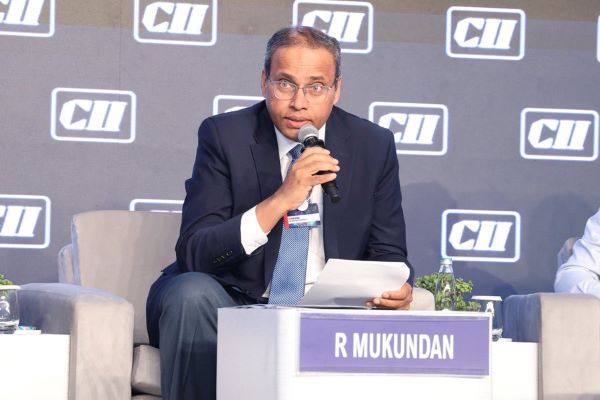Mukundan stressed the importance of investing in small modular nuclear reactors (SMRs) and welcomed the government’s efforts to address civil liability issues in nuclear energy

R. Mukundan, Vice President, CII and MD & CEO, Tata Chemicals, emphasized the need for a context-specific, multi-technology approach to energy transition, especially given India’s limited access to affordable natural gas.
Highlighting biomass as a vital but underused resource, he pointed to its potential in hard-to-abate sectors like aviation, where options like waste cooking oil are inadequate.
He was speaking at a session on “Geopolitics of Energy Transition: India’s Strategic Imperative” during the CII Annual Business Summit 2025. "India needs a sector-wise roadmap to 2045 with clear milestones," said Mukundan.
He also stressed the importance of investing in small modular nuclear reactors (SMRs) and welcomed the government’s efforts to address civil liability issues in nuclear energy.
“Each industry needs different forms of energy steam, power, or liquid fuels. We must avoid over-reliance on any one source like solar or wind,” he noted, calling for investment in energy storage and domestic manufacturing to reduce import dependency.
Dr. Ranjit Rath, Chairman and Managing Director, Oil India, highlighted the company's focus on expanding natural gas exploration, emphasizing its role as a key transition fuel. “We aim to enhance participatory exploration and identify new gas-bearing areas,” he said, while citing India’s 100% City Gas Distribution coverage.
K.V. Sajay, CEO, Zelestra India, underscored the need for long-term government support to attract serious investors in the renewable energy space.
Deepak Thakur, CEO, Mahindra Susten, pointed out that energy security and energy transition should be looked at in an integrated manner to create the most effective solution for India. He emphasised on having a strategy centered on supply chain resilience, technological innovation, and strategic diversification in the energy sector.
Addressing the panel, Thakur offered a pivotal insight, stating that India is among the few countries globally experiencing energy demand growth of 6.5%, which calls for a distinct, integrated approach to energy planning. He also highlighted lithium LFP batteries as key for 2–4-hour renewable storage in the next 3–5 years and stressed the need for grid integration and supportive regulations.
Dr. Ajay Mathur, Former Director General, International Solar Alliance, skilfully navigated the discussion drawing out critical insights on critical mineral access, supply chain vulnerabilities, and emerging technologies.
The panel unanimously emphasized that India’s energy transition requires a balanced, multidimensional approach, one that supports economic growth, technological advancement, and environmental sustainability.
This high-level session was part of the CII Annual Business Summit 2025, held at the Taj Palace, New Delhi, under the broader theme of ‘Building Trust’, reinforcing CII’s commitment to shaping a sustainable and resilient industrial future for India.
Subscribe to our newsletter & stay updated.